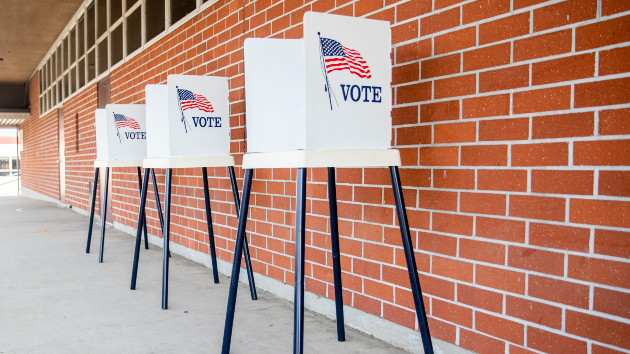
(WASHINGTON) — Donald Trump first introduced unsubstantiated election fraud conspiracy claims into the political mainstream during the 2016 campaign before making them the focus of his final months in the White House and the two years since, inspiring a slew of candidates and supporters who believe the same.
It’s an alarming trend, according to some election experts and historians who warn, if left unabated, it could weaken — or in the extreme — dismantle American democracy.
The ABC News series “Democracy in Peril,” which rolls out this week, is examining questions and concerns about America’s democratic institutions at all levels in the wake of Jan. 6. The riot at the Capitol exemplified, some experts say, how extreme election denial has been on the rise, especially among Republicans — and can be intertwined with violence. And the constant drumbeat of denialism, these experts say, is eroding the very foundation of trust that democratic institutions rely on to function.
“For the election system to work, our entire democracy to work, depends on trust in the election system. That is the reason why there is and has always been a peaceful transition of power after elections in the United States,” said Wendy Weiser, who directs the Democracy Program at the Brennan Center for Justice. “And if that belief isn’t there, then there’s a real risk that can see more resistance to peaceful transitions of power, more resistance to the electoral system overall.”
Sporadic and groundless claims of widespread election fraud have been made since the country’s founding, but in modern times they have never been made more consistently — and now, polling suggests a full third of the electorate thinks that Biden’s victory was illegitimate. Much of it is tied to Trump, experts say, after he made the fraud claims a litmus test for GOP candidates and the heart of his platform.
Experts note such claims weren’t made after two close presidential elections in 1960 and 2000, which were each controversial and could have been contested, and while some Democrats did object to the presidential results in Ohio in 2004, that effort was shut down in two bipartisan votes. And while there have been decades-long disputes over how relaxed or restrictive voting should be — flaring during the civil rights movement, for example — experts say the lack of faith in today’s elections and state legislatures’ efforts to clamp down on access to the ballot is unique.
“There’s nothing that even remotely compares to what we’re going through right now,” presidential historian Mark Updegrove told ABC News.
Trump first baselessly cast doubt on the 2016 Republican primary process before it became clear he would win, and he went on to allege voter fraud cost him the popular vote in 2016, again without evidence, even though he won the Electoral College over Hillary Clinton.
He later set up a White House commission to find evidence of widespread fraud, though it was shut down when it was unable to do so. Still, while running for reelection in 2020, he warned that his potential defeat could be explained only by fraud.
He kicked his election claims into hyperdrive after he lost both the popular vote and the Electoral College in 2020. The outgoing president and his allies then launched a series of legal challenges — which were almost unanimously rejected — and, since leaving the White House, he still uses his role as de facto Republican Party leader (and in crowded rallies, in widely seen social media posts and elsewhere) to push his false accusations. He recently suggested the 2020 election somehow be redone nearly two years later.
“It’s no surprise that he did so in 2020. But he did so as an incumbent president, which makes it a lot more powerful,” Updegrove said of Trump. “And we’ve never seen an incumbent president challenge the results of an election before.”
Surveys suggest Trump’s drumbeat over what he and his supporters term “election integrity” is having an impact. An ABC News/Ipsos poll from January found that 20% of the public was very confident about the electoral system but that 59% of Republicans either were “not so confident” or “not confident at all,” despite no findings of widespread election fraud or wrongdoing.
Republican candidates have taken up Trump’s mantle. Various nominees this year for governor, Senate, state secretary of state and more local offices have echoed baseless claims of fraud and, should they win their races in November, could have outsized sway in certifying the results for the White House in two years, repeating how some lawmakers in 2020 tried to use their power to change the outcome in favor of Trump.
“Perhaps more dangerous even than what the former president is saying is the fact that elected officials in Congress and in the states and those running for elections to Congress and to the states are accepting the same false narrative and using it themselves for their own political purposes, as opportunists,” said Mary McCord, the executive director of the Institute for Constitutional Advocacy and Protection at Georgetown University.
On top of that, fraud claims have also formed the basis for some recent state laws restricting access to the ballot because local lawmakers believe certain kinds of voting are suspicious.
But the most extreme reaction by some election deniers has been violence, exemplified by the deadly rioting by Trump supporters at the Capitol as Congress met to certify the 2020 election for Joe Biden.
“It’s not a democracy anymore when you use every means available, including means that are not lawful, to silence your opponents — whether silencing their vote or silencing their voice,” McCord said.
“And we’ve seen that that’s the kind of thing that causes supporters in the online space and the on-the-ground space to consider acts of political violence and engage in intimidation and threats and even worse, such as the attack on the Capitol,” she added.
Concerns over violence stemming from denialism and attacks on elections have spiked since last year’s insurrection, with election officials at the local level facing rising levels of threats, harassment and intimidation, producing over 1,000 federal investigations.
And while experts say a second insurrection at the Capitol is unlikely, the threats to local and state officials could be harder to stamp out.
“In fact, that’s really the strategy right now, is decentralized extremist activity at the county level, county by county and up to the state level because it’s harder to take that with one single effort when … it’s disparate like that,” McCord said.
Experts who spoke with ABC News said vocal denouncements from bipartisan political leaders could help blunt the impact of unsubstantiated election fraud claims on American democracy — but doing so soon could be crucial.
“Our own research is showing with the right stakeholders communicating faith in the system, that people can and will be moved and this can again be a fringe position,” she said. “But that requires leadership, and that requires the top leaders of all political parties and in other institutions to commit to refraining from spreading this kind of disinformation and spreading disruptive rhetoric relating to our election system.”
“I think that we still can turn things around,” Weiser said. “I think that there are still some opportunities to do so. But I think that the time window is short.”
Copyright © 2022, ABC Audio. All rights reserved.
